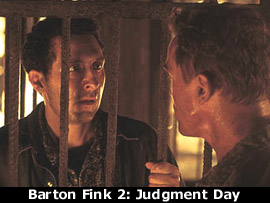Venomous (2001) – DVD
½*/**** Image A- Sound C Extras B
starring Treat Williams, Mary Page Keller, Hannes Jaenicke, Geoff Pierson
screenplay by Dan Golden
directed by Ed Raymond
by Walter Chaw I have a theory about Treat Williams: I believe that he, after being passed over for an Oscar for his magnificent performance in the 1981 Sidney Lumet film Prince of the City, has been on a vicious retributive rampage against the American viewing public. There can be no other explanation for an obviously gifted actor to have starred in three Substitute sequels and in films alongside Joe Piscopo and Michelle Pfeiffer. After watching the direct-to-video shocker Venomous, directed and commented upon by one of the keepers of Ed Wood’s flame, Ed Raymond (a.k.a. Fred Olen Ray, Nicholas Medina), I officially concede victory to Williams. You win this round, Mr. Williams–no más…no más.

 by Walter Chaw
by Walter Chaw